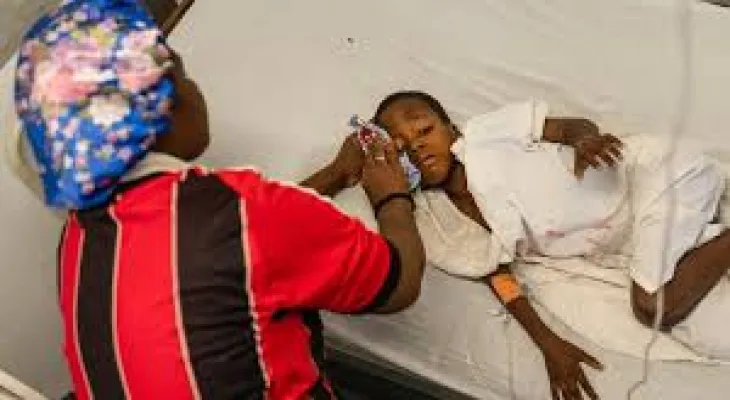Search here
Newspaper
Search here

Arab Canada News
News

Published: April 23, 2024
One morning in a hospital located in the heart of the gang-infested area of Haiti's capital, a woman began to convulse before her body trembled as a doctor and two nurses rushed to save her.
They attached electric leads to her chest and activated the oxygen machine while keeping their eyes on the computer screen, which reflected a dangerously low oxygen level at 84%. No one knew what was wrong with her.
What was even more concerning was that the Médecins Sans Frontières hospital in the poor Cit Soleil neighborhood was suffering from a shortage of essential medications to treat convulsions.
Dr. Rachel Lavin, a physician with the medical assistance group, said, "The medication she really needs, we can barely get."
It's a familiar scene repeated daily in hospitals and clinics across Port-au-Prince, where life-saving medications and equipment dwindle or are completely absent as brutal gangs tighten their grip on the capital and beyond. They have blocked roads, forced the closure of the main international airport in early March, and paralyzed operations at the country's largest seaport, where containers filled with crucial supplies remain stuck.
Lavin said, "Everything is collapsing."
The health system in Haiti has long been fragile, but it is now on the brink of total collapse after gangs launched coordinated attacks on February 29, targeting vital infrastructure in the capital and beyond.
The violence has forced many medical institutions and dialysis centers to close, including Haiti's largest public hospital. The State University of Haiti Hospital, located in downtown Port-au-Prince, was supposed to reopen on April 1 after it was shut down when the attack started, but gangs infiltrated it.
One of the few institutions still operational is the Université de la Paix hospital, located south of the closed airport. Between February 29 and April 15, the hospital treated about 200 patients with gunshot wounds, and its beds are still full.
The hospital's director, Dr. Paul Junior Fontilous, stated, "We are in urgent need of fuel because we are working with generators, otherwise we risk closing our doors."
More than 2,500 people were killed or injured across Haiti from January to March, representing an increase of over 50% compared to the same period last year, according to a recent United Nations report.
And even if the hospital is open, sometimes there are only a few medical staff or none at all, as gang violence erupts daily in Port-au-Prince, forcing doctors and nurses to stay home or return if they encounter blocked roads guarded by armed men.
The escalating chaos has left an increasing number of cancer, AIDS, and other seriously ill patients without any refuge, with gangs also looting and setting fire to pharmacies in the capital's downtown area.
Lavin said that Médecins Sans Frontières itself has run out of many medications used to treat diabetes and high blood pressure, and asthma inhalers that help prevent deadly attacks are nowhere to be found in the capital.
She said that the medical staff at the Médecins Sans Frontières hospital recently tried to save a boy suffering from a severe asthma attack by administering oxygen. It didn’t work, nor did any other type of medication. Eventually, they ended up injecting him with adrenaline, which is used in emergencies to treat allergic shock.
Lavin added, "We are improvising and doing our best for the people here."
Project Coordinator for Médecins Sans Frontières, Jacob Burns, warned that people's health is deteriorating due to the lack of essential medications they need for their chronic illnesses.
He added, "It becomes critical and options run out for them." "For some people, there are very few options right now."
Despite the urgent need for medical care, Médecins Sans Frontières hospital in Cit Soleil has had to reduce the number of outpatients it treats daily from 150 to 50, according to Burns, although they still attend to all emergencies.
Dozens of people line up outside the hospital each day and face the risk of being shot by gang members controlling the area while they wait for medical care.
Everyone is allowed to enter the hospital complex, but the medical staff has set up a triage to identify the fifty people who will be seen. Burns said that those with less urgent needs are asked to return another day.
On Friday morning, 51-year-old Jean Marc Baptiste entered the emergency room with a blood-stained bandage on his right hand. He said that the police in an armored vehicle shot at him the previous day while he was gathering firewood to sell for heating in a gang-controlled area.
Once inside, the nurses removed the bandage to reveal a deep wound on his thumb as he screamed in pain. Lavin told him he needed plastic surgery, which is not available at the hospital, and ordered X-rays to make sure there were no fractures.
Staff members stated that the Cit Soleil hospital receives an average of three wounded individuals daily, but sometimes the number now reaches 14.
Burns said that five people shot arrived at the hospital recently after spending the entire night in a public bus that couldn’t move due to heavy gunfire.
He stated, "The city of Cit Soleil has been a center of violence for a long time." "And now the violence is spreading so widely that it has become a problem for everyone."
Comments